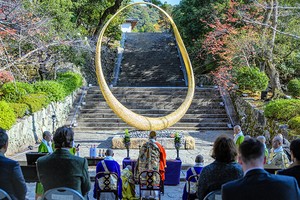By SHINICHI IKEDA/ Staff Writer
February 25, 2024 at 15:45 JST
Historians have reason to rejoice following the emergence of records kept by former Prime Minister Kiichi Miyazawa of his day-to-day political activities over 40 years until the last stage of his life.
Miyazawa, who served as prime minister between 1991 and 1993, recorded his meetings and thoughts in 185 notebooks from December 1966 to September 2006, a year before his death.
He was among the mainstream conservative politicians within the ruling Liberal Democratic Party who established a postwar policy to pursue a lightly armed, economy-oriented nation.
He was also known for his opposition to revising the pacifist postwar Constitution.
The notebooks had been stored at Miyazawa’s office. His family entrusted them to political scientist Takashi Mikuriya.
Mikuriya, a professor emeritus at the University of Tokyo, formed a group of researchers and studied the documents with The Asahi Shimbun.
“These are first-rate historical materials that must be referenced in any future study of postwar politics,” Mikuriya said.
Miyazawa always kept the notebooks close by, even in his final years, and referred to them whenever necessary.
In principle, two facing pages are devoted for each day.
A secretary of Miyazawa wrote a detailed schedule of events on the left-hand page, complete with attendees at meetings.
On the right-hand page, Miyazawa wrote about the contents of meetings and his brief impressions. He also wrote up the contents of telephone conversations he had after returning home.
In an entry for Oct. 11, 1991, two weeks before his victory in an LDP presidential election, Miyazawa wrote, “I learned that the Takeshita faction had decided to back Miyazawa. This largely decided the outcome.”
On the day when Shin Kanemaru, an LDP heavyweight who served as vice president under Miyazawa, was arrested in a tax evasion case in March 1993, Miyazawa wrote, “The arrest was unavoidable.”
Miyazawa, who was fluent in English, called former U.S. Secretary of State Henry Kissinger on Nov. 4. 1992, when U.S. President George H.W. Bush lost to Democratic candidate Bill Clinton in the presidential election.
He wrote in English that Kissinger told him, “Our side is losing.”
In 1992, Miyazawa authorized the dispatch of the Self-Defense Forces to Cambodia after the law on cooperation with U.N. peacekeeping operations was enacted.
In 1993, he resigned as prime minister following the LDP’s loss in a Lower House election, which ended its 38-year rule as the governing party.
Mikuriya said there are no other complete comparable records of activities of leading politicians who were active in the front lines of postwar politics spanning several decades.
He said Miyazawa’s records will enable historians to verify historical facts and undertake a cross-sectional analysis by comparing them with accounts of other politicians and bureaucrats.
The Asahi Shimbun has been studying Miyazawa’s records with the group of researchers led by Mikuriya.
The research team is building a database that will allow cross-searching of Miyazawa’s records with Asahi Shimbun articles, records of Diet proceedings and other reference materials. It is considering when and how to release the database in the future.




















A peek through the music industry’s curtain at the producers who harnessed social media to help their idols go global.
A series based on diplomatic documents declassified by Japan’s Foreign Ministry
Here is a collection of first-hand accounts by “hibakusha” atomic bomb survivors.
Cooking experts, chefs and others involved in the field of food introduce their special recipes intertwined with their paths in life.
A series about Japanese-Americans and their memories of World War II